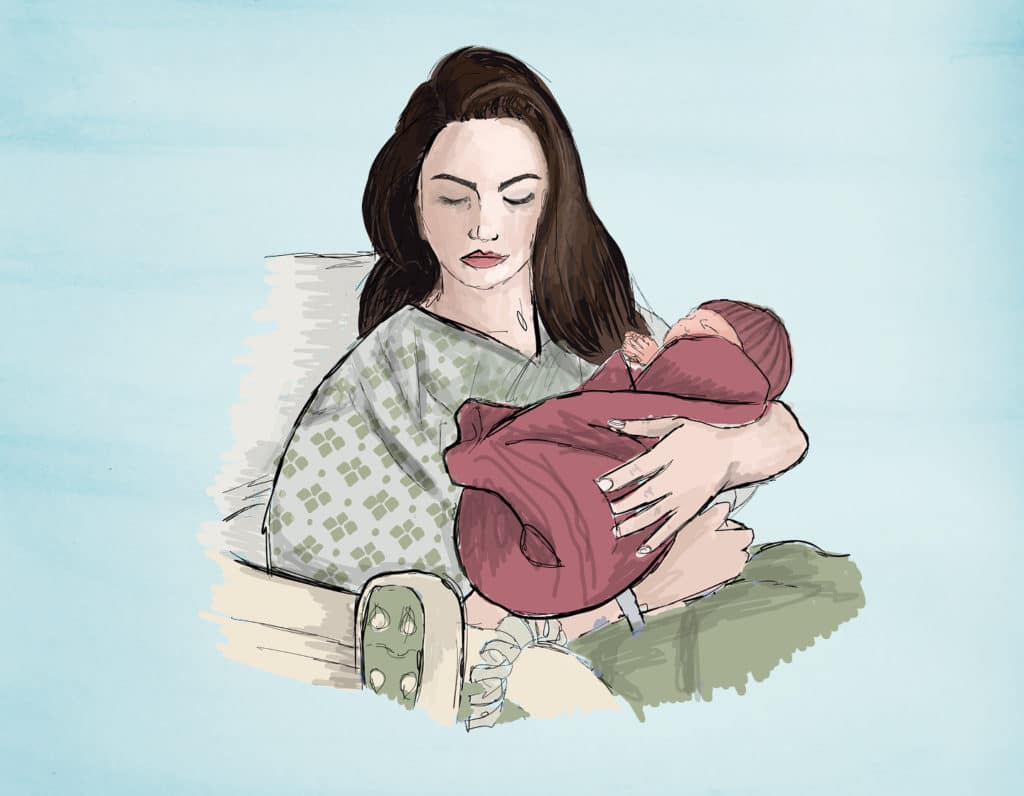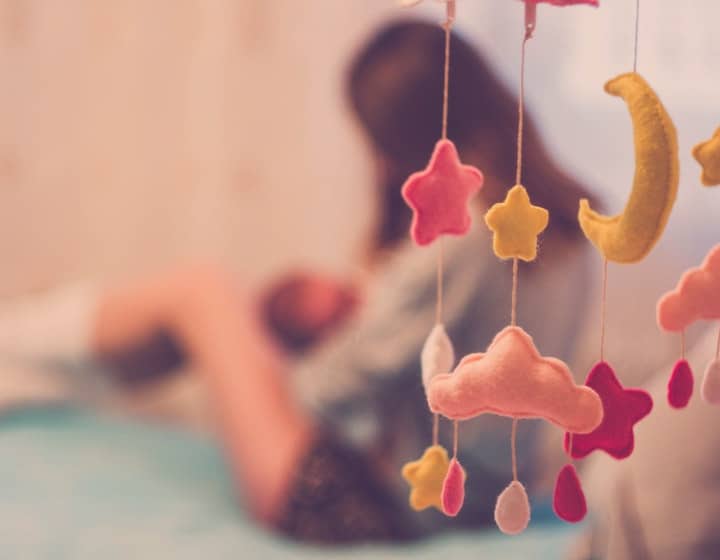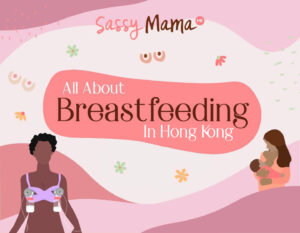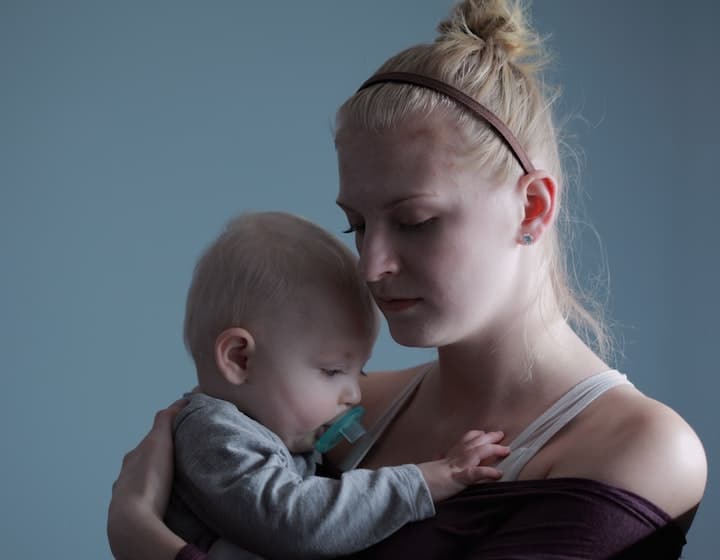
 Post Category - ExpertsExperts - Post Category - Health & FitnessHealth & Fitness
Post Category - ExpertsExperts - Post Category - Health & FitnessHealth & Fitness Post Category - PostnatalPostnatal - Post Category - Health & FitnessHealth & Fitness
Post Category - PostnatalPostnatal - Post Category - Health & FitnessHealth & FitnessIn keeping with May being Maternal Mental Health Month, here’s good advice to follow.
Becoming a mama is something many women dream about. Thoughts of what your baby will look like, what name to choose, how to style the nursery…the list is endless and it’s oh so exciting. As a midwife though, I see how much of the focus is on the labour and birth, and how little we tend to think about the postnatal period. I’m passionate about opening up the discussion around what the “fourth trimester” or postpartum period might look like (for mama and not only bubba), and ways in which education, partners and families can provide the utmost support.
In my experience of working in clinical maternity, I frequently witnessed the start of mental health problems during this period. So much so, that I felt the need to better educate myself and women around me, and decided to study a postgraduate certificate in perinatal mental health. With that in mind, here’s what you need to know about postnatal or postpartum depression.
Editor’s note: Please note this is general advice only. If you are experiencing a mental health condition you should seek personal and professional help.
Read more: Your Guide To Meditation And Mindfulness In Hong Kong

Maternal Mental Health
There are a variety of mental health difficulties and conditions that women can experience during the perinatal period (pregnancy and the postpartum period). These include depression, anxiety, OCD, PTSD and postnatal psychosis. Some of the common mental health triggers in pregnancy are a traumatic birth, previous mental health conditions, unplanned pregnancy and inadequate support.
Women experience such a huge array of emotions after giving birth – these can include joy, empowerment and a sense of achievement. But for some women, these can be feelings of trauma, fear and anxiety. It is important for you to reflect on this, knowing that it is okay to have these feelings. The physical and hormonal changes our bodies endure post-birth are likely to cause strong emotions, including one such unexpected feeling – depression.
If you have had a baby recently, you may remember feeling all of the emotions by day three. You could be crying for no identifiable reason, feeling extremely overwhelmed and utterly exhausted. This is often known as the “Baby Blues” and can last up to two weeks after birth. As many as 70-80% of women will experience the Baby Blues after they give birth. Your body has just nurtured and birthed a tiny little human, so make sure to love yourself extra hard during this time, and to speak up and ask for help when you need it, mama!
Read more: The Fourth Trimester: What To Expect When You’re No Longer Expecting
Baby Blues Or Postnatal Depression?
Most women will have heard about the Baby Blues, but when does this morph into something more serious? The biggest barrier to seeking medical help as a new mother, I believe, is not knowing what is “normal” vs. what is “abnormal”.
It is estimated that roughly 1:7 women and 1:10 dads will experience postnatal depression (these statistics are also likely underreported). Postnatal depression is classed as a diagnosis of depression within the first 12 months of a baby being born.
Some of the most common symptoms include:
- Fatigue
- Hopelessness
- Sadness
- Feeling overwhelmed
- Losing interest or lack of interest in your baby
- Reduced appetite
- Thoughts of suicide or self-harm or harming your baby (if you are experiencing any of these symptoms or know of someone that might be, please seek help from a medical professional ASAP).
Lack of sleep is completely normal after having a baby, and this can make you feel flat and irritable. It is important not to confuse this with PND. A good indication that you might be going through PND is if you find it difficult to sleep, even when you are tired and have the opportunity to sleep.
It can often be daunting to acknowledge and voice these feelings to others. However, you are NOT alone and by seeking help you are doing the best possible thing for yourself and in turn, your baby. Something we as health professionals always reiterate is, this does not make you a bad mother in any way! Just like millions of women in the world, you need some help, and that is 100% okay.
Read more: Sassy Mama’s Roundup Of Couples And Family Counsellors In Hong Kong

Getting Help
Postnatal depression and other postpartum disorders are treatable through counselling, psychiatric evaluation and when necessary, medication. There is no shame in seeking help for yourself. As someone that suffers from anxiety, I know it can feel very alienating and rather frightening. I encourage you to share your feelings with someone, as this is the first step in ensuring you do not feel alone in navigating your motherhood journey. Start an honest and open conversation with your partner, your GP or a friend and know that help isn’t far away.
Some Helpful Resources In Hong Kong
MIND Hong Kong, Unit D, 9/F One Capital Place 18 Luard Road Wan Chai, Hong Kong, 3643 0869, www.mind.org.hk
OT&P Family Clinic – Annerley, LG floor, Century Square, 1 D’Aguilar Street, Central, Hong Kong, 2983 1558, [email protected], www.annerley.com.hk
The Mental Health Association of Hong Kong, 2 Kung Lok Road, Kwun Tong, Kowloon, Hong Kong, 2528 0196, www.mhahk.org.hk
Amity Mutual Support Society, G/F, Henry G Leong Yau Ma Tei Community CTR, 60 Public Square Street, Yau Ma Tei, Kowloon, Hong Kong, 2332 2759, 6777 9687, www.amss1996.org.hk
HK FamilyLink Mental Health Advocacy Association, 16/F, Shanghai Centre, 473-475 Shanghai Street, Mong Kok, Kowloon, Hong Kong, 2144 7244, www.familylink.org.hk
United Centre of Emotional Health & Positive Living, 5th Floor, Block J, United Christian Hospital, 130 Hip Wo Street, Kwun Tong, Kowloon, Hong Kong, 2349 3212, www.ucep.org.hk
The Samaritan Befrienders Hong Kong, Shui Tin House, Pak Tin, Kowloon, 3rd Floor, Block B, Room 1, 2319 2688, English Emotional Support Hotline: 2389 2223, [email protected], www.sbhk.org.hk
Help Hotlines
Suicide Prevention Services, 2382 0000, www.sps.org.hk
Social Welfare Department 24-Hour Hotline, 2343 2255, www.swd.gov.hk
Hospital Authority Mental Health Direct (24 Hours), 2466 7350, www3.ha.org.hk
Family Health Service 24-Hour Information Hotline, 2112 9900, www.fhs.gov.hk
The Samaritan Befrienders Hong Kong, 2389 2223, www.sbhk.org.hk
Read more: 9 Health And Wellness Apps For Busy Hong Kong Mums
 View All
View All


 View All
View All


 View All
View All

 View All
View All


 View All
View All









